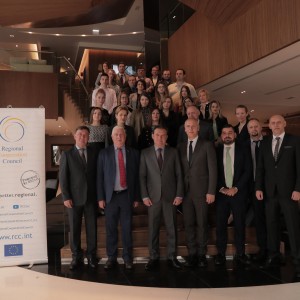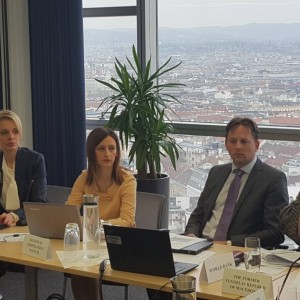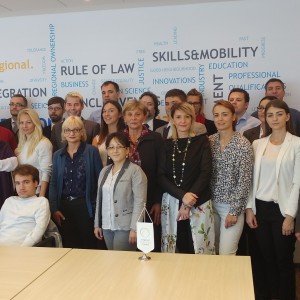RCC Secretariat concludes 2008 series of presentations across Southeast European capitals in Ankara today
02 December 2008
ANKARA/SARAJEVO – Experts of the Regional Cooperation Council (RCC) Secretariat ended in Ankara today a series of presentations on the organization’s work across Southeast Europe (SEE).
Over 500 representatives of national SEE administrations, business sector, civil society and the media took part in the presentations on RCC priorities, projects and activities. The tour was organised in close cooperation with the RCC members from Southeast Europe and witnessed high interaction of the participants.
The RCC experts lead by Jelica Minic, Deputy Secretary General and Head of Expert Pool, started the tour on 1 October with the event in Chisinau, the capital of Moldova, current Chair of the South-East European Cooperation Process (SEECP). Subsequent presentations were held in Sofia on 15 October, Belgrade on 10 November, Podgorica on 12 November, Skopje on 17 November, Zagreb on 24 November, Athens on 26 November, and Ankara on 2 December.
The presentations focused on RCC work in the priority areas of economic and social development, energy and infrastructure, justice and home affairs, security cooperation, building human capital, and parliamentary cooperation.
During the presentation in Sofia, Bulgarian Deputy Minister of Foreign Affairs Lyubomir Kyuchukov emphasised Bulgaria’s strong support for the RCC and the country’s readiness to contribute to regional cooperation. He noted that irrespective of all problems that the region is encountering in terms of instability, there is a clear awareness that many of the problems can be resolved only with joint efforts on a regional basis.
The Deputy Montenegrin Foreign Minister, Milorad Scepanovic, gave full support to the work of the RCC Secretariat and proposed several regional projects, most notably in the field of security cooperation and disaster prevention and preparedness.
At the presentation in Athens, the Secretary General for European Affairs at the Greek Ministry of Foreign Affairs, Dimitris Katsoudas, stressed the importance of regional cooperation and development of regional projects that would contribute to economic and social development of Southeast Europe. He underlined the importance of the RCC as the focal point for regional projects in Southeast Europe.
The Director for Neighbouring Countries and Southeast Europe at the Croatian Ministry of Foreign Affairs and European Integration, Davor Vidis, underlined the importance the Croatian Government pays to cooperation in Southeast Europe and pointed out that the RCC showed high efficiency already in the first year of its existence. He stressed that the organization became the main interlocutor of the European Commission and other international actors when it comes to regional cooperation.
In the end, the Turkish Deputy Undersecretary of Foreign Affairs, Zergun Koruturk, also highlighted the RCC role as the main interlocutor of the European Commission for identifying and facilitating regional projects in Southeast Europe. She stressed that the RCC presentation will help develop Turkish priorities and projects in regional cooperation, especially in view of the incoming Turkish SEECP Chairmanship-in-Office.
The 2009 series of presentation is expected to open early in the year in Bosnia and Herzegovina, the host of the RCC Secretariat, and continue in the remaining SEE capitals and in Brussels, the seat of European and Euro-Atlantic institutions.
For more information on the presentations in RCC members from Southeast Europe, check the links below:
Moldova:
http://www.mfa.gov.md/noutati/3508/
Bulgaria:
http://www.mfa.bg/en/index.php?option=com_content&task=view&id=9128&Itemid=217
Serbia:
http://www.mfa.rs/Srpski/Foreinframe.htm
Montenegro:
http://www.vlada.cg.yu/vijesti.php?akcija=vijesti&id=165586
Croatia:
http://www.mvpei.hr/custompages/static/hrv/templates/_frt_Priopcenja.asp?id=4218
Greece:
http://www.mfa.gr/www.mfa.gr/Articles/el-GR/261108_P1310.htm



